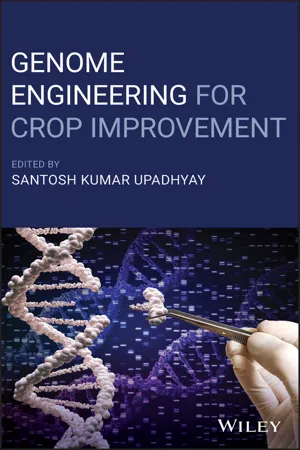
- English
- ePUB (mobile friendly)
- Available on iOS & Android
Genome Engineering for Crop Improvement
About this book
In recent years, significant advancements have been made in the management of nutritional deficiency using genome engineering—enriching the nutritional properties of agricultural and horticultural crop plants such as wheat, rice, potatoes, grapes, and bananas. To meet the demands of the rapidly growing world population, researchers are developing a range of new genome engineering tools and strategies, from increasing the nutraceuticals in cereals and fruits, to decreasing the anti-nutrients in crop plants to improve the bioavailability of minerals and vitamins.
Genome Engineering for Crop Improvement provides an up-to-date view of the use of genome editing for crop bio-fortification, improved bioavailability of minerals and nutrients, and enhanced hypo-allergenicity and hypo-immunogenicity. This volume examines a diversity of important topics including mineral and nutrient localization, metabolic engineering of carotenoids and flavonoids, genome engineering of zero calorie potatoes and allergen-free grains, engineering for stress resistance in crop plants, and more. Helping readers deepen their knowledge of the application of genome engineering in crop improvement, this book:
- Presents genetic engineering methods for developing edible oil crops, mineral translocation in grains, increased flavonoids in tomatoes, and cereals with enriched iron bioavailability
- Describes current genome engineering methods and the distribution of nutritional and mineral composition in important crop plants
- Offers perspectives on emerging technologies and the future of genome engineering in agriculture
Genome Engineering for Crop Improvement is an essential resource for academics, scientists, researchers, agriculturalists, and students of plant molecular biology, system biology, plant biotechnology, and functional genomics.
Tools to learn more effectively

Saving Books

Keyword Search

Annotating Text

Listen to it instead
Information
Table of contents
- Cover
- Table of Contents
- Title Page
- Copyright Page
- Dedication Page
- List of Contributors
- Preface
- About the Editor
- Acknowledgments
- 1 An Overview of Genome‐Engineering Methods
- 2 Distribution of Nutritional and Mineral Components in Important Crop Plants
- 3 Application of Genome Engineering Methods for Quality Improvement in Important Crops
- 4 Genome Engineering for Enriching Fe and Zn in Rice Grain and Increasing Micronutrient Bioavailability
- 5 Development of Carotenoids Rich Grains by Genome Engineering
- 6 CRISPR‐Cas9 System for Agriculture Crop Improvement
- 7 Contribution of Crop Biofortification in Mitigating Vitamin Deficiency Globally
- 8 Genome Editing Approaches for Trait Improvement in the Hairy Root Cultures of the Economically Important Plants
- 9 Phytic Acid Reduction in Cereal Grains by Genome Engineering
- 10 Genome Engineering for Nutritional Improvement in Pulses
- 11 The Survey of Genetic Engineering Approaches for Oil/Fatty Acid Content Improvement in Oilseed Crops
- 12Genome‐Editing Mediated Improvement of Biotic Tolerance in Crop Plants
- 13 Genome Engineering and Essential Mineral Enrichment of Crops
- 14 Genome Editing to Develop Disease Resistance in Crops
- 15 Biotechnological Approaches for Nutritional Improvement in Potato (Solanum tuberosum L.)
- 16 Genome Engineering Strategies for Quality Improvement in Tomato
- 17 Genome Editing for Biofortification of Rice
- 18Genome Editing for Improving Abiotic Stress Tolerance in Rice
- 19 Role of Genome Engineering for the Development of Resistant Starch‐Rich, Allergen‐Free and Processing Quality Improved Cereal Crops
- 20 Engineering of Plant Metabolic Pathway for Nutritional Improvement
- 21 Genome Engineering for Food Security
- Index
- End User License Agreement
Frequently asked questions
- Essential is ideal for learners and professionals who enjoy exploring a wide range of subjects. Access the Essential Library with 800,000+ trusted titles and best-sellers across business, personal growth, and the humanities. Includes unlimited reading time and Standard Read Aloud voice.
- Complete: Perfect for advanced learners and researchers needing full, unrestricted access. Unlock 1.4M+ books across hundreds of subjects, including academic and specialized titles. The Complete Plan also includes advanced features like Premium Read Aloud and Research Assistant.
Please note we cannot support devices running on iOS 13 and Android 7 or earlier. Learn more about using the app